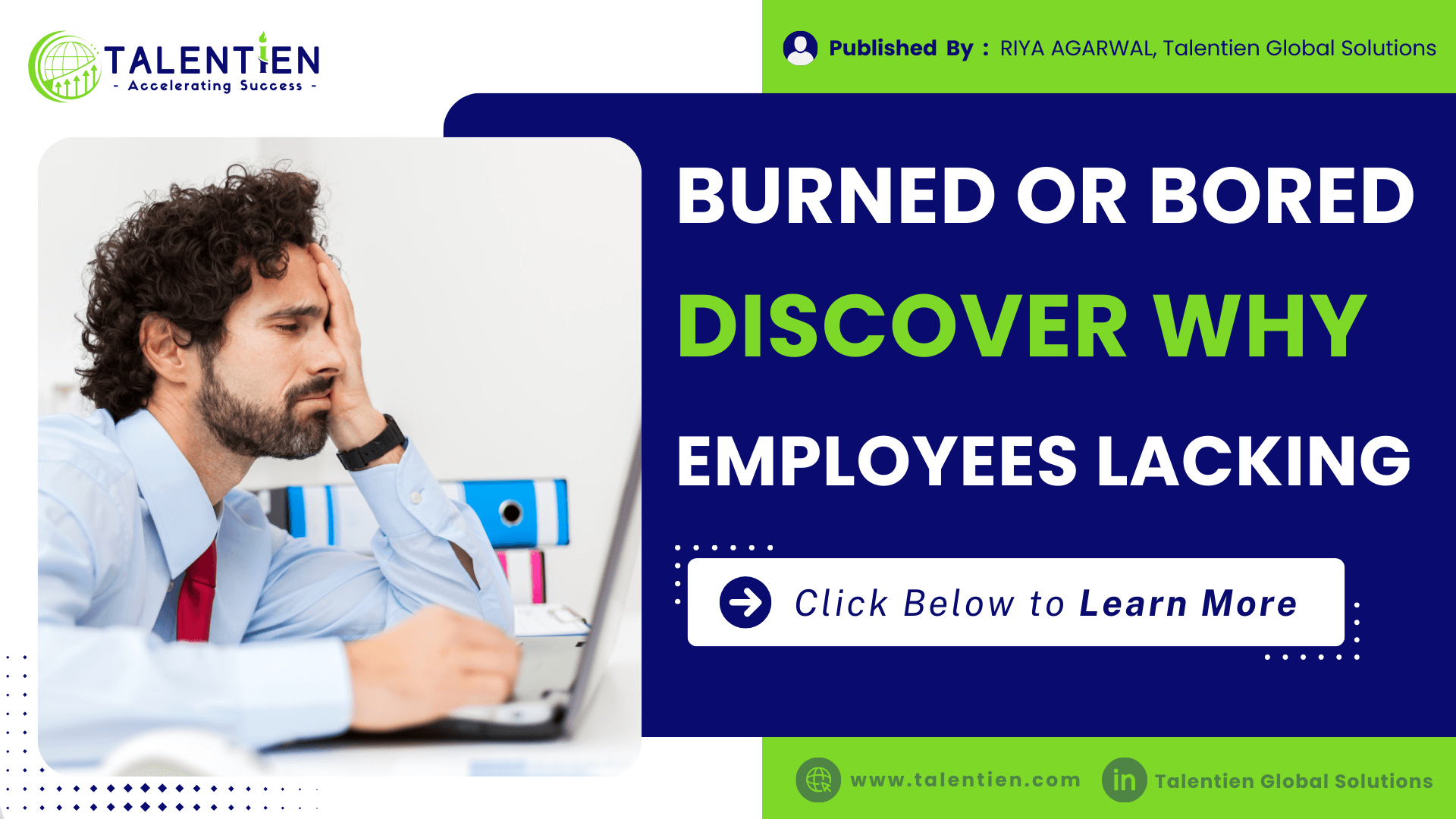Let’s be real – we’ve all sat through those meetings where someone’s clearly just… not there.
They’re physically present, yeah, but mentally? Checked out. You can see it in their eyes, in the way they answer questions with the least number of syllables possible. Something’s off.
And if you’re in HR, you’ve probably seen this more times than you can count. Disengaged employees.
Some burned out, some bored out, and honestly, a bunch of them stuck somewhere in between – just quietly fading into the background.
But here’s the kicker: most companies still don’t know the actual reason their people are disengaging.
They either blame it on the employees (“they’re just not motivated anymore”) or toss around the word “burnout” like a catch-all.
But what if it’s not just burnout? What if some of your people are bored stiff?
Let’s break this down.
Table of Contents
ToggleWhat Does BURNOUT Look Like?
You already know the signs, don’t you?
Always tired. Like, always.
Irritable. Snapping at tiny things.
Constant stress. Even from simple tasks.
Emails going unanswered.
They used to go the extra mile… now they’re barely going one.
Burnout usually comes from too much. Too much pressure, too many tasks, too little recognition, and basically, no space to breathe. And it’s not just a productivity issue — it’s a mental health issue. We’ve seen good people spiral because they were running on empty for months and nobody stopped to ask how they were really doing.
And in Indian corporate culture? Burnout is worn like a badge of honor. “Hustle culture” has turned overwork into something to flex about. Founders romanticize 16-hour days. Teams celebrate who stayed online till 2 a.m. But at what cost?
When someone’s burned out, they’re not lazy – they’re exhausted. And no, a pizza party on Friday won’t fix it.
But BOREDOM? That’s the Silent Killer
Here’s the one that catches people off guard: bored out employees.
And no, it doesn’t mean they’re lazy or don’t care. It means their work doesn’t challenge them anymore. It doesn’t excite them. They’ve outgrown their role, but no one noticed. Or worse – no one cared.
You ever see someone sit at their desk, scroll aimlessly, attend every meeting but contribute nothing? They’re not overworked. They’re underwhelmed. And it eats away at them slowly. Unlike burnout, boredom isn’t loud. There’s no meltdown. No late-night Slack messages screaming for help. Just silence. Until one day they resign – and everyone’s shocked.
I had an employee once – brilliant, sharp, had ideas for days. But her manager? Gave her the same repetitive tasks for a year straight. She didn’t burn out. She bored out. When she left, she said, “I just stopped feeling useful.” And that stuck with me.
So… Which One Is It?
Here’s the hard part: burnout and boredom often look the same from the outside. Low energy, disinterest, declining performance. But the cause? Completely different. And unless we dig deeper, we’re just guessing.
Burned out? You’ll hear things like :
“I just can’t keep up anymore.”
“I feel like I’m always behind.”
“Even on weekends, I’m thinking about work.”
Bored out? You’ll hear :
“I’m not learning anything new.”
“Every day feels the same.”
“I could do my job with my eyes closed.”
And sometimes, it’s a mix. They’re bored and burned — doing mindless work under relentless pressure. That’s the worst of both worlds.
What Can HR Actually Do?
Let’s be honest – diagnosing disengagement isn’t easy. We’re not therapists, we’re not mind readers. But we are culture keepers. And it’s on us to create space where people can speak up before they check out.
1. Talk. Like, really talk.
Not just once a year during appraisals. Real check-ins. Ask your people: “Are you feeling challenged?” “Do you feel overwhelmed?” “What’s draining you?” You’ll be surprised what they tell you – if you actually listen.
And please, stop asking “How are you?” like a formality. Ask it and mean it.
2. Push for job crafting
Some employees don’t want a promotion. They just want something new. A side project, a chance to shadow another team, a stretch assignment. HR needs to work with managers to make roles more dynamic. Let people reshape their work to fit their strengths.
3. Watch the high performers
You know who hides burnout best? Your top performers. The overachievers. The “I’ll take care of it” people. The ones you trust blindly. They’ll keep delivering — until one day, they don’t. Check in on them. They might not ask for help, but they often need it the most.
4. Kill the hustle culture
In Indian startups especially, overwork is still glorified. That needs to stop. HR can lead the charge here. Encourage boundaries. Normalize logging off. Start with leadership — if they’re online 24/7, the team feels guilty for taking a breath. It has to start at the top.
5. Build room for boredom to speak up
People won’t say, “I’m bored.” They’ll feel guilty. Or they’ll assume they’ll be seen as ungrateful. Create a culture where it’s okay to say, “Hey, I need something more.” Where boredom isn’t a red flag, but a sign someone’s ready for the next level.
A Personal Note – Because This Matters
I’ve been there. Burned out and bored. At one point, I was managing payroll, compliance, hiring, training — all by myself — while attending leadership meetings and firefighting culture issues. There was no off button. And weirdly? I wasn’t learning anything new either. I was just stuck in survival mode.
I didn’t leave the company, but I almost did. What saved me was a leader who saw I was fading and said, “Let’s redesign your role.” That conversation changed everything. Sometimes, that’s all it takes.
Final Thoughts
Disengagement isn’t always about motivation. Sometimes it’s about overload. Sometimes it’s about monotony. But either way, it’s our job to pay attention.
So next time someone starts zoning out in meetings or stops bringing their spark — don’t jump to conclusions. Ask. Listen. And remember, burnout screams. Boredom whispers. You’ve got to be tuned in to hear both.
And if you’re a founder, a manager, or anyone building a team — please don’t wait for the resignation email to realize something’s wrong. Culture is built in the small moments. Disengagement is too.




